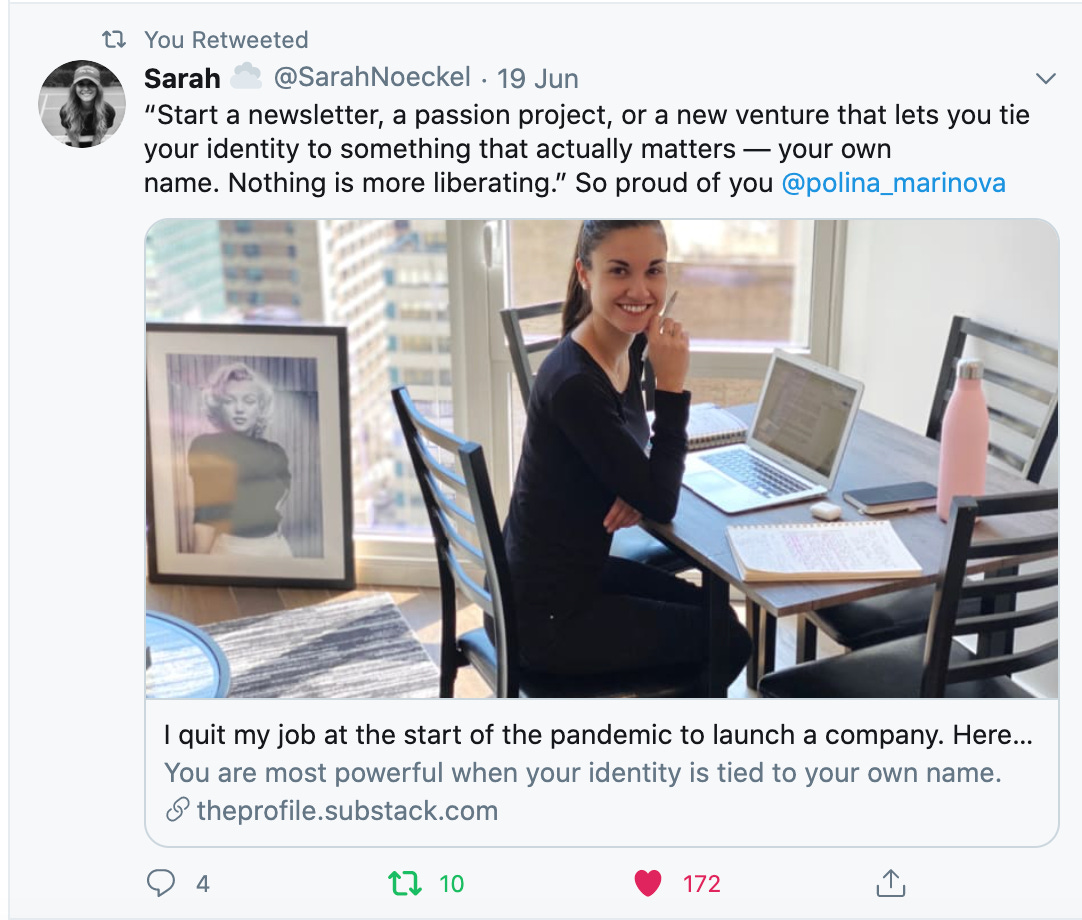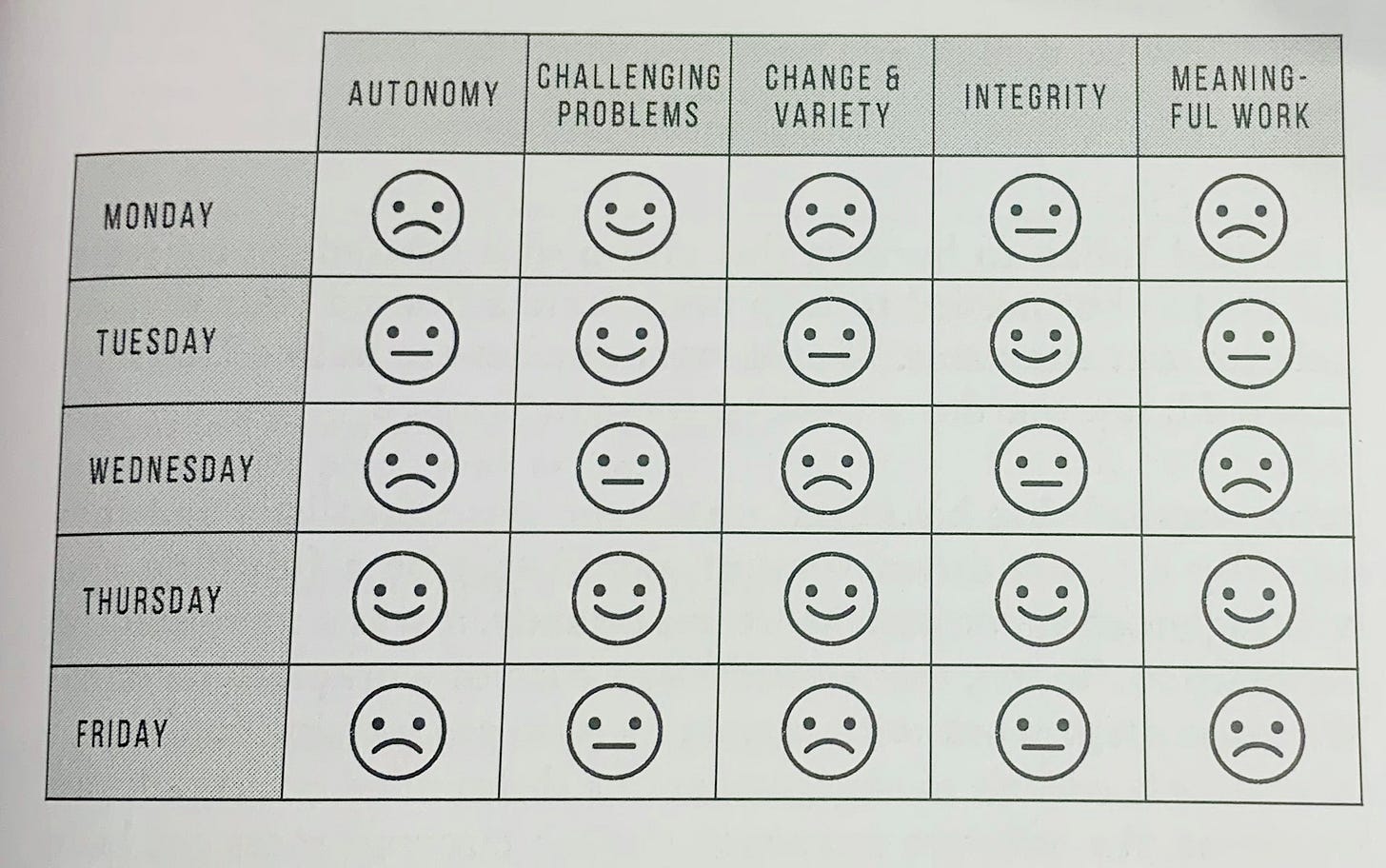Can you really make an income from your passion?
Your new email format is here and we begin by exploring the overlap between passion and income. Is it truly possible? #001
Hi readers
You came, you saw, you voted. Thank you.
I asked for your input on themes for this newsletter and with the most votes came ‘Things I’m learning about across coaching, mindset and psychology’ followed by ‘Practical tips & tricks to follow in your career’. I’m very excited about this and can’t wait to delve into the archives of old things and new. Expect the odd case study on a courageous career path from time to time too.
I believe that career success is a combination of the right know-how and the right mindset, so we’ll tackle both angles in the form of a weekly question.
This week: Can you really make an income from your passion?
Let’s dig into this further.
Firstly, by differentiating passion from purpose.
To have a purpose in your work means that your work meets your core values and you believe in the ‘why’ behind it. Passion, on the other hand, implies your extreme love or enthusiasm for something.
In a 2003 study of college students at the University of Quebec by Robert Vallerand, found students to be much more passionate about sports, art, and music than anything they were studying. But the reality is only 3% of jobs can be found in those industries. (Paul Jarvis writes about this in Company of One).
A passion for something does not automatically lend itself to a practical application. Think of all the wannabe professional football players around the world who had to settle for an office job. Passion is part of the equation but it needs to be accompanied by skill.
For the majority of people what happens is that they work hard at something first to find that their passion then develops over time. This happens through solving problems you care about and that you are also well placed to solve.
But we’re living in an era where people assume they should be passionate about something before they invest their time and energy into it. Younger generations are unclear why they feel unfulfilled in the workplace in the years where they are still honing their craft. You have to build a skill or reputation you are proud of first.
Cal Newport, author of ‘So Good They Can’t Ignore You’ and ‘Deep Work’ argues that passion is a side effect of mastering your craft. Mastery is gained through deliberate practice. To use passion as the yardstick against which to measure career satisfaction is not always helpful.
Remember Polina Marinova from last week? Her newsletter is now her full-time gig since she quit her job. She writes up long-form profiles on interesting people.
She is passionate about understanding people’s lives and careers and writing about them. But she didn’t wake up one day declaring to the world her right to do this full time. She did it alongside her job first and built a loyal audience through her newsletter. Alongside her job as a journalist (writing profiles on people).
There’s a reason for the well-known trope of the starving artist. This mentality comes from people who designed their work around their passion before assessing the feasibility and profitability of it.
I’m not here to discourage you.
My mission is to help people pursue courageous career paths. Courageous insinuates taking some risk. But I want to help you do this in a manageable way that tests whether your interests can support you to earn a decent income.
What are you passionate about?
Baking?
Ok, let’s say your day job is in marketing. You could create a social media account for your home-baked goods and build an audience who you can sell to over time, perhaps until the point you have traction and decent sales. You would use your marketing skills to support your passion project until it became a business.
This is different to say, quitting your marketing job and starting a brick and mortar bakery. You’d have to deal with all the administrative and logistical overheads that would bring. You’d find yourself running a business all hours of the day with little time left to do the part you love - baking.
If I look at my career, I’ve become passionate about helping other people with theirs. As a headhunter and now a coach. But I didn’t come out of the womb this way, I’ve developed this interest over years of working in the field.
Is helping people with their careers my passion? I’m not sure. I love it, but I love other things too like interior design, board games, improv, reading, yoga, and writing too. To make an income from any of those things would require real determination at the expense of one of the others, but it is doable.
Take writing. Since you’re reading this newsletter for free you’d be right in guessing that I do not make money writing. But I am passionate about it. No one is paying me to write because I haven’t earnt my dues doing it yet.
Tim Denning is a prolific writer. He is someone that earns a decent income from writing online alongside his career.
But he’s written thousands of articles online.
I mention Tim not just to labor this point but because of the way he talks about earning money from his writing. Read this sensational headline below - he’s letting you know you can do this too.
This article is 4 min long and probably earnt Tim over $5,000 on the Medium Partner Programme based on the number of ‘Claps’ it has.
He’s differentiating writing from business, which is boring. He claims. Writing is fun and everything else is ‘conventional’ boring fodder.
But what this fails to acknowledge is that writing alone does not build wealth. It’s through creating an email list and selling your services to this audience. Or getting ad sponsors. Or guest blogging.
All those activities take you out of the sphere of writing and into sales and marketing. Writing online brings a lot of fiddly tech stuff you have to deal with behind the scenes too.
Tim has created a media empire. He’s learned the art of persuasion (read that title again if you need convincing) and how to get his name out there. He has also written a lot.
Tim Denning is not ill-intentioned. He believes what he is saying is true because he’s proof you can earn good money from writing about things you love. But you have to put in the work. If you love baking you could create a mini media empire about baking and earn serious money. But you’d have to love writing and doing all of the online activities too in order for it to be your passion - and suddenly you’re not really baking.
I wrote this article on choosing a career path on Medium recently. It took many revisions and countless days to get right. It took time and attention away from things I could have earnt money doing… Here are my earnings from the Medium Partner programme.
I might treat myself to a coffee but I won’t be paying my rent with that.
Again, I really am not trying to discourage you. Just know that when people tell you to just do what you love, their advice is not always helpful. There are many other factors you have to take into consideration.
Below is a formula from business coach Vanessa Lau to help you determine whether your business idea can earn you money
It needs to meet all of the following criteria:
Will I be happy to do it, even for free?
Do I see myself doing this long term?
Can I afford to do it?
Is there real demand?
Can I scale it?
NB. Doing it for free is important in the early days when you’re still getting your name out there and practicing.
I did many hours of free coaching between Jan - June this year and loved it.
Without demand and scale, you have a hobby.
Without seeing yourself doing it happily for a long time (or free at all) then you have a soul-crushing business that may as well be your 9-5 you’re trying to escape.
If you can’t afford to do it and set it up then it’s too risky.
If you can tick all those boxes - congrats. You’ve found something that lets you build an income from your passion.
Here’s a self-coaching tool you can use
If you’re trying to figure out which parts of your work are and aren’t working for you, use your values (what’s important to you) as a filter. This example is of a client with values of Autonomy, Challenging Problems, Change and Variety, Integrity, and Meaningful Work.
If you need help understanding your values email me and I’ll send you a worksheet to determine yours.
By the end of the week, you can assess what is and isn’t working. With this client, they were able to look at Thursday as an isolated case. What made Thursday so great? They were in a brainstorming day tackling hard problems that felt meaningful. This was a clue to how to create more opportunities like this in their work to enjoy it.
So what was the conclusion?
Yes, you can build an income from your passion. It just takes time and patience.
But that doesn’t mean you shouldn’t enjoy the ride along the way to finding passion. Continue figuring out what you’re good at, notice when you come alive, and what you care about the most. Work on your skills and become known for them.
My article about Carving a Unique Career Path breaks this down into six steps if you need a helping hand.
That’s a wrap. Thank you for reading! This newsletter is very new for me so it is always great to know if you enjoyed reading by clicking the ❤️, sharing with your friends or simply replying to say hello.
See you next week for a new question!
Ellen







